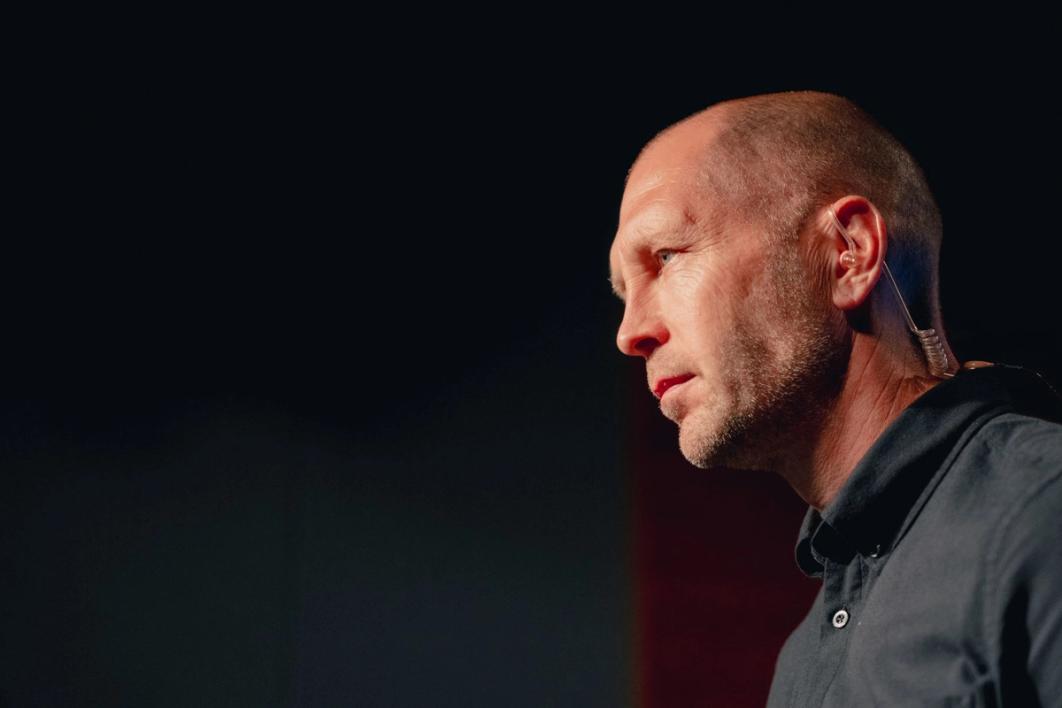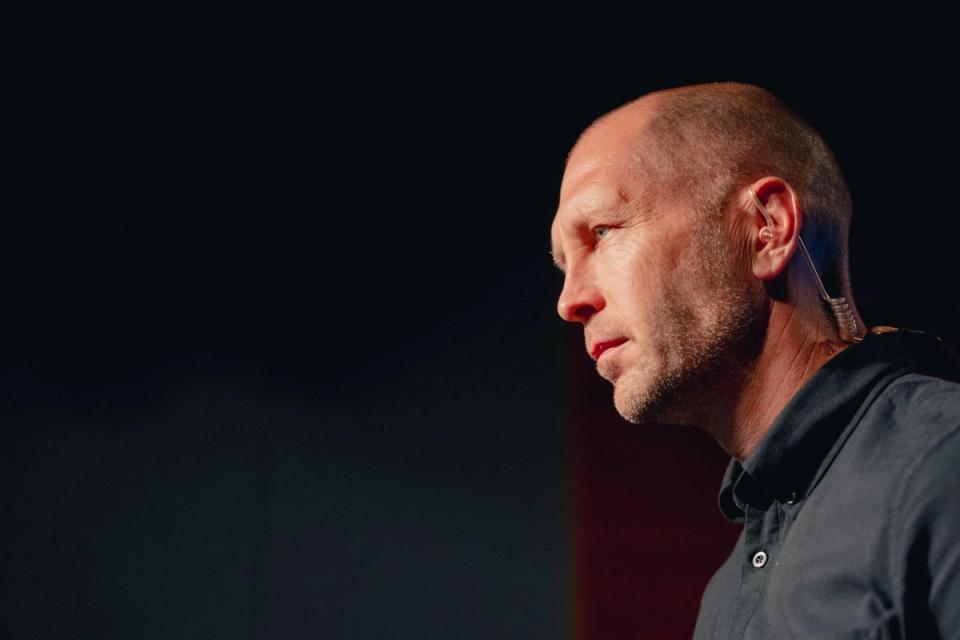During a nationally televised broadcast Jan. 4 on FOX and Telemundo which included an appearance by USMNT head coach Gregg Berhalter, FIFA revealed the tournament’s full schedule, which will culminate with the final to be played in New York/New Jersey at MetLife Stadium. The quadrennial tournament is set to take place across the United States, Canada, and Mexico from June 11-July 19, 2026.
The USMNT will begin its journey through the tournament’s group stage at Los Angeles’ SoFi Stadium on June 12, before heading up the west coast for their second match at Lumen Field in Seattle on June 19, and will conclude group play with a return to SoFi Stadium for a match on June 25.
Following the announcement, Berhalter spoke with national media about the USA’s group schedule, plans for the buildup in 2026 including time at the National Training Center in Atlanta, and what it means to New Jersey native that the World Cup Final will be played in his hometown backyard.
Opening comments:
“It's great to finally learn where we will be for the group stage of the 2026 World Cup. It brings it to life and makes it exciting. We would have been happy at any of the venues because we know the home support is going to be incredible in this World Cup. We know where we're at and now we can start planning which is a big part of it. We know from the last World Cup how important it is to get the environment right. We look forward to an amazing World Cup.”
On NY/NJ hosting the Final:
“I mentioned that all the venues I think are going to be spectacular for the World Cup and that includes in Canada and Mexico. It’s going to be a special World Cup to have the final in New York/New Jersey. It’s a dream come true for me being from the area and I'm sure for most people from that area. It’s an area with a rich soccer tradition and known for producing players. To think about when I was little going to watch the Cosmos and then selling out Giants Stadium and now this stadium is going to host a World Cup final, it's really special.”
On not having to change time zones during the group stage:
“It is important and that was a factor. It's no secret that the teams were able to give FIFA some input in terms of the venues, and our main piece of advice was about trying to minimize travel and minimize time zone changes because we know the wear and tear that can take on your body during a major tournament.”
On whether he had a preference for which area of the country to play the group matches:
“All the stadiums are going to be great, all the fan the support is going to be great and it will be an amazing World Cup. The one piece of input was really about trying to minimize travel, whether you're on the East Coast or the West Coast. I think it gets tricky when you talk about four or five hour flights between games and different time zone shifts. FIFA ultimately made the decision and we're really thankful that at least they asked for our input. I'm sure they did the same for Mexico and Canada. It just shows that they're in tune with the host nations, which I think is important.”
On the discussions with FIFA and how much input they had:
“We had informal conversations with FIFA at various levels of their organization and really then a final conversation with the technical department, just trying to figure out what were some of our needs. We communicated that and then it was ultimately in their hands as far as the decisions go. We're happy with how it turned out. We look forward to being in LA with the stadium being probably one of the best stadiums in the world and getting to play there twice in the group stage. Then we get to go up to the Pacific Northwest where I haven't been personally as a coach. I'm looking forward to it because I remember the days of playing against Seattle Sounders and the amazing crowd support that they have. I mentioned their famous ‘March to the Match’ to the stadium and I'm just picturing us in the team bus going through the city and seeing all the people. I’m getting goosebumps talking about it now, so it's really exciting.”
On the planning that has been done already in terms of base camp and travel before the World Cup:
“We've done a lot of work on the base camp already. As you know, we're building a National Training Center, and that will be open before 2026. So that's very much in our plans to utilize our National Training Center, a state-of-the-art facility. I'm thinking about the guys going there for the first time - it's going to blow them away. So, we're going to utilize that and then somehow shift over to the West Coast for the tournament and be based there. We see it as a dual usage type of thing, but we'll probably be based in Southern California, go out to the Seattle game, come back right after the game and finish the group in LA.”
On whether there were discussions or plans for where the U.S. knockout games would be played if they advance:
“That's a good question. Again, the idea there is I think with all the teams - not just the United States or Mexico or Canada - is that you get them to a location throughout the tournament and you don't have teams jumping across the country. My guess is we'll probably make our way towards the East Coast as we continue to advance in the tournament, so I think the time zone adjustment could be gradual and you to get to experience some of the other stadiums of the great venues that are in the World Cup.”
On Los Angeles getting to host eight games in the World Cup and what that means for the area:
“That's why you invest that much in a state-of-the-art stadium like that, so you get to host eight games. You have the two games in the group stage for the United States, a quarterfinal and other games that will have a huge impact on the results of the World Cup. Los Angeles has a melting pot of cultures, a bunch of different people coming together. It’s a great location to watch soccer, and I'm sure throughout the 2026 World Cup it's going to be a great venue.”
On the lessons learned from the 2022 FIFA World Cup in Qatar that will be helpful for 2026:
“The thing that is most important is from the competition perspective. We had 25 of 26 players making their World Cup debut in 2022. Now going into 2026, we'll have guys that have been there before. That's the most important thing: understanding what these games are like with the levels and the fine line between success and failure. Those are all key elements of the World Cup that we needed to learn. As a staff, in terms of the environment around the training ground and the base camp, it's really important to get that right. You're in the same area for a long period of time, so you're going to have to plan that out carefully. Overall, how do we continue to build the team culture in base camp? How do we continue to have great training environments and then on gameday, what's that experience like? What are the stadiums like? Those are all things to consider.”
On whether the various experiences of travel and opponents for the USMNT in the last four years will give the team an advantage in the U.S.:
“That's certainly part of it. But I think the advantages are just going to come from the supporters and the fans. It’s not just about the venues where we have matches, it’s about having the whole country behind us when we're playing. Having communities across America tuned in is just an amazing feeling. We know how Americans get behind their teams, we know how Americans can host international events, so when you add those two things together, it's going to be an incredible environment for our team. That's the first thing. The second thing is when you think about this long window that it is a lot more time between games. We will most likely be using Atlanta prior to the start of World Cup, which would be great to be in our own facility. Then we head out west for the tournament. Hopefully we get back to the Atlanta area for semifinals.”
On whether he is excited about promoting the World Cup in his role as head coach:
“The promotional piece to me is also about the public getting to know our team between now and 2026, because they really represent American diversity at its best. When you think about our group, it's good guys, it's hard-working guys, it's guys that want nothing but to make the nation proud. That would be my goal between now and the World Cup. We want these guys to be household names and that the public really knows them as personalities and really is behind them and pulling for them to be successful.”
On what the expanded 48-team World Cup will mean from a competition and from a fan perspective:
“I think it’s great for global soccer and growing the game. We have an initiative to grow the game of soccer in the United States and the World Cup is going to help, and what 48 teams in the World Cup does is help that global reach. There's going to be 48 countries that are deeply invested in how their team does at the World Cup. It's going to be a new format and exciting for a lot of people. There's going to be teams that have probably never been to the World Cup going for the first time. So, I think it’s exciting. What it does for the group from a competition perspective is still to be determined. When we played Uzbekistan and Oman in September, one of the ideas is that these could potentially be teams that qualify from Asia, so it's great to start playing them now. Playing Ghana, an African team that's expected to be in the World Cup is another. It’s going to be interesting to see how that pool expands and as we get the exact teams and see how the qualifying shapes up, we'll be able to really game plan and scout our opponents thoroughly.”
On the importance of putting on a good performance when the World Cup comes to North America:
“The objective is always to perform really well and go as far as you can, and you always want to do great. We wanted to do great in 2022, and when you look at it, we performed well but there's better levels to reach. Now on our home soil, we know how much home fans can help and how home fans can push the home team. For us it's about making our nation proud. When I think about the dreams that our players had growing up, playing at local clubs in their communities and now playing at some of the biggest clubs in Europe, for them it’s an opportunity to grow the game. One way to really grow the game and to change soccer in America forever is to perform well and do something that no U.S. team has ever done before.”
On the appearances of Kevin Hart and FIFA President Gianni Infantino on the schedule announcement show:
“We've already sent Kevin Hart a tattoo that says ‘USA All the Way.’ [editor’s note: Hart joked about getting this tattoo during the show.] I think it just shows the global reach of football and how popular it is worldwide. You get superstars coming out to be on the unveiling of the final and the group stage schedule. Soccer is huge globally and everybody knows that. We're most excited for the public to get to know our team up close and personal and then to really experience what high-level soccer is about in this major tournament. The last time we hosted the Men's World Cup was in 1994. The Women's World Cup was in 2003. So, it's been quite a while and now to see this international event and all the people coming from abroad to come to the United States and really enjoy the show is going to be special.”






